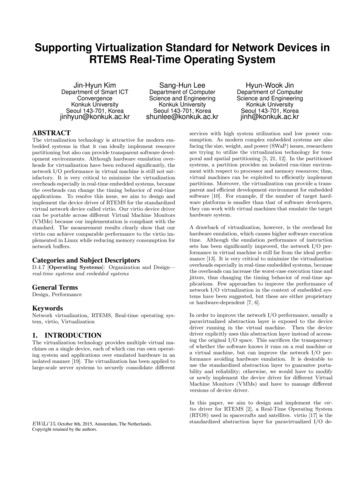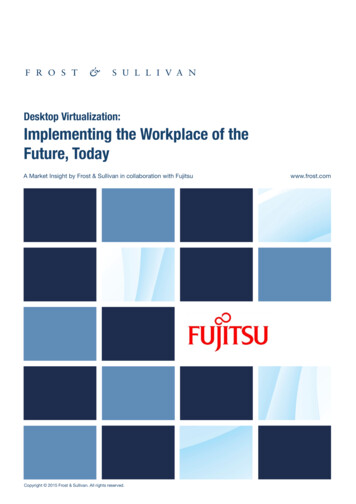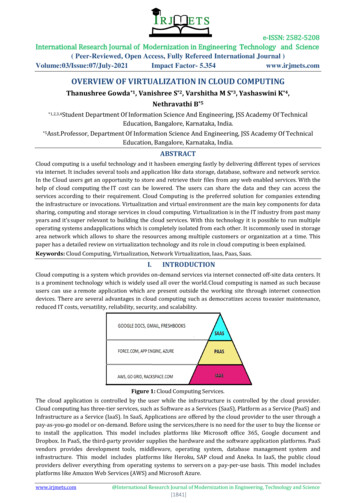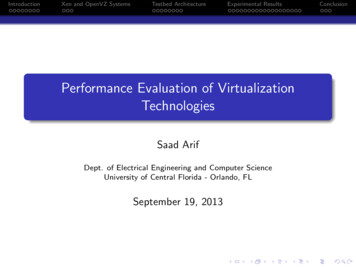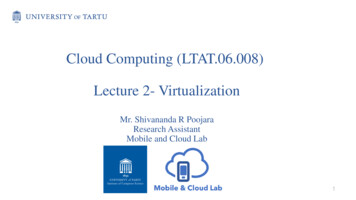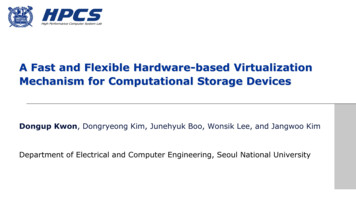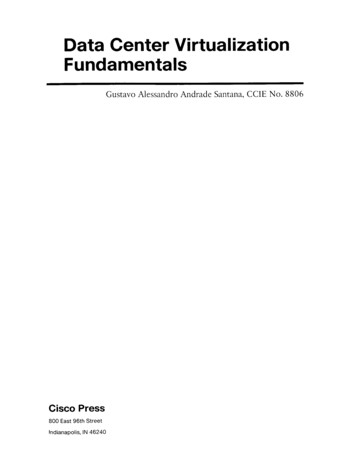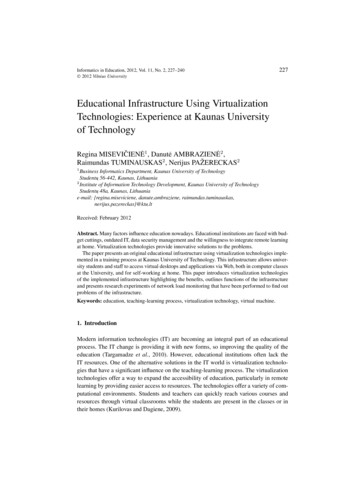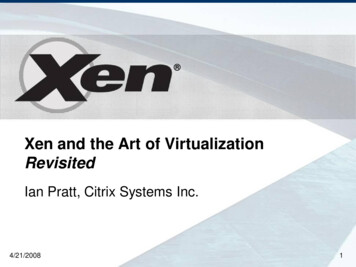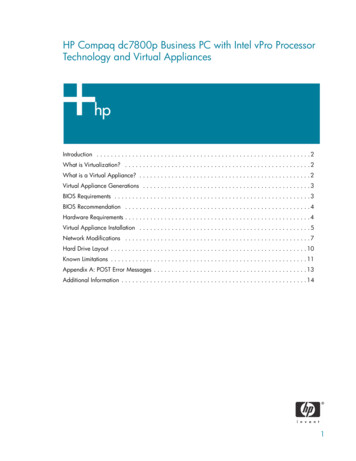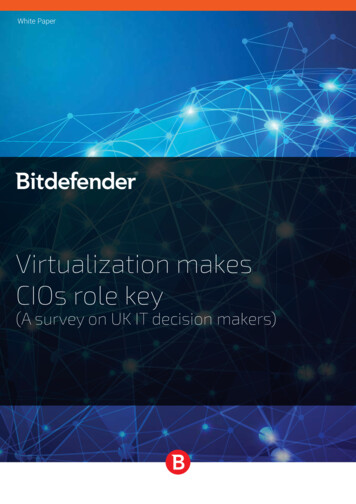
Transcription
White PaperVirtualization makesCIOs role key(A survey on UK IT decision makers)
White PaperExecutive summary:A Bitdefender survey of 153 IT decision makers in the United Kingdom in companies with more than 1,000 PCs, shows they will rise incompanies’ hierarchies, as CEOs and board members face increasing internal and external security risks that could ruin customer trustand business forecasts. Still, not all C-suites include CIOs/CISOs in the business decision-making process. This survey, carried out byiSense Solutions, shows how IT decision makers perceive their role inside the organizations and what they need to meet shareholderexpectations. How has virtualization changed the security game? How many attacks can be stopped with the current resources? Wouldthey pay to avoid public shaming?Key indings: A third of CIOs say their job is more important in the company’s hierarchy. Another third even agree their job has been completelytransformed in recent years. Nine in 10 IT decision makers perceive IT security as a top priority for their companies. However, less than two-thirds agree their ITsecurity budget is suficient. Cloud security spending surpassed the amount spent on physical security (from the total IT budget). Cloud security spending increased for 49 percent of the companies in the past year, while the IT security budget for other securityactivities remained the same. Only 55 percent of cyberattacks can be stopped, detected or prevented with the current resources. Some 30 percent of companies were breached in the past 12 months, while 87 percent of IT decision makers don’t know how thecompany was breached. More than half of UK companies would pay an average of 82k to avoid public shaming scandals after a breach. Some 5 percentwould pay more than 500k.2016 gave rise to unknown security challenges that IT decision makers have to prevent by adopting breakthrough technologies able toight zero-day exploits, Advanced Persistent Threats, and other devastating types of cybercrime. Furthermore, virtualization and adoptionof hybrid environments have signiicantly increased the attack surface, causing more headaches for those who have to secure allinfrastructures, physical or not. More businesses are entrusting more sensitive data and workloads to cloud providers, as 63 percent ofcompanies already run IT operations in the cloud, 36 percent operations, 34 percent customer service, marketing and sales, and 32 percentinance too1.The hybrid cloud market will grow at a compound annual rate of 27% until 2019, according to research irm MarketsandMarkets, as1[2]“Moving forward with cybersecurity and privacy”, PwC, Oct 2016, uards.pdf
White Papercited by The Journal2.The company expects the hybrid cloud market to more than triple to 85 billion in 2019, from 25 billion in 2014.Gartner surveyed attendees at one of its tech conferences and found that nearly 75% of large enterprises there planned to have hybrid ITdeployments, as in the hybrid cloud, by the end of last year. Large companies that have invested heavily in on-premise architectures andmigrated data to the cloud will be the biggest ambassadors of the hybrid model.These changes occur in a brutal reality where cybercrime led to estimated inancial losses of more than 500 billion in 2015 alone, - andthat may be doubling in 2016. From ransomware attacks aimed at a quick buck, to APTs (Advanced Persistent Threats) aimed at siphoningintellectual property and customer data, cybercrime has also become a highly proitable industry. Many of these complex attacks havebeen successful, realizing Bitdefender’s predictions about the complex threat landscape in 2016.“On the business side we will see an increase of targeted attacks and strongly obfuscated bots, with a short lifespan and frequent updates.Most of these attacks will specialize in information theft,” Bogdan Dumitru, Bitdefender’s Chief Technology Oficer, predicted in December2015. “Attackers will be in and out of an organisation in a few days, maybe even hours. APT, which currently stands for Advanced PersistentThreats, should change to BA for Blitzkrieg Attacks,” he said. “Lateral movement in the infrastructure of cloud service providers will increasewith the advent of tools that allow hackers to compromise the hypervisor from a virtual instance and jump to a different virtual machine. Thisscenario is particularly dangerous in ‘bad neighbourhood’ environments where an ill-intended party could get to share a physical system witha legitimate service provider or business.”A Bitdefender study on large UK companies revealed that the rising pressure of cyber breaches and Blitzkrieg Attacks has prompted CEOs toconsider CIOs as one of the most important C- level managers, joining COOs and CFOs in decision-making strategies, and bringing securityto board-level thinking. Some 34 percent of IT decision makers feel their job is more important in the company organigram than ever before,while another 29 percent admit their job has completely changed in the past years.Hybrid environments brought the CIOs in the boardroom (%)4035302520151050My job is more important in the company’s hierarchy34%My job has completely transformed in the past years29%My job is as important as it used to be 37%Even though nine in 10 IT decision makers perceive IT security as a top priority for their companies, they think the budgets need to increaseby a third to deliver eficient IT security policies.According to Gartner, the lack of engagement with the business is a major cause of differing risk views between the security team andthe business, which can result in redundant and mismanaged controls, which in turn result in unnecessary audit indings and ultimately inreduced productivity3.Perception on the IT security budget (%)1008060It is a top priority for the company 88%It is not a top priority for the company 12%40200Bitdefender’s survey shows that 60 percent of IT decision makers think that the IT security budget is suficient, 31 percent say the budgetis suficient but they are understaffed, and 7 percent say it is suficient but could not accommodate future expansion. Only 3 percent of ITdecision makers surveyed said the IT security budget in their company is insuficient.2SPECIAL REPORT: CIOs Say Hybrid Cloud Takes Off, WSJ, -cios-say-hybrid-cloud-takes-off/3“Gartner Survey Shows Information Security Governance Practices Are Maturing”, Gartner, July 21, 2015, http://www.gartner.com/newsroom/id/3098118[3]
White PaperSecurity’s arrival at board level is also conirmed by one in three CEOs, who admit having met four to six times in the past 12 months withtheir executive team or board of directors on cyber security. Changes will continue to happen as IT security budgets increase in comingmonths and more chief information security oficers believe hackers may gain the upper hand two to ive years from now, requiring strongerand more innovative defensive measures. And CEOs have started to understand that, although CIOs are not certain of all the methodsmalicious hackers use to iniltrate systems, and businesses do not want to disclose their safety measures, as previous studies conirmed4.Cloud security spending increased for 49 percent of the companies in the past year, while the IT security budget for other security activitiesremained the same, Bitdefender’s survey shows. While almost two-thirds of IT decision makers say the security budget is suficient, therest would need a future increase of 30 percent, on average, to deliver eficient IT security policies. This is mainly because migratinginformation from traditional data centers to a cloud infrastructure has signiicantly increased companies’ attackable surface, bringing newthreats and more worries to CIO ofices regarding the safety of their data. From the total base of the IT decision makers, they say only 55percent of cyberattacks can be stopped, detected or prevented with the current resources, on average.IT security attacks that can be stopped/detected/prevented with the current resources (%)0403530252015105025% or less 28%26-75% 37%76-90% 23%More than 90% 12%Bitdefender’s survey shows 30 percent of companies were breached in the past 12 months, while 87 percent of IT decision makers don’tknow how the company was breached.Cybercriminals can spend large amounts of time inside organizations without being detected - APTs are often deined as designed toevade detection. In the virtualization paradigm, since nothing being executed in raw memory is encrypted – just scrambled – APTs that tryto execute malicious code on a virtual machine will be intercepted by Bitdefender’s Hypervisor Introspection technology long before theyactually compromise the operating system. In fact, as soon as the malicious code, even delivered via zero-day exploit, tries to execute inthe VM’s memory, the introspection engine will immediately “see” the malicious action and the code that was trying to execute.Moreover, more than half of companies in the UK would pay an average of 82k to avoid public shaming scandals following a security breach.Some 5 percent would pay more than 500k, conirming that negative media headlines could have substantial inancial consequences. Ina recent case, oficials from Verizon, which agreed to buy Yahoo’s core properties for 4.83 billion in July, told reporters that the companyhas “a reasonable basis” to suspect that the Yahoo security breach, one of the largest ever, could have a meaningful inancial impact on thedeal, according to multiple reports. This further highlighted the risk that cyber incidents could eventually destroy signiicant transactionsor even whole under the enormous pressure from both stakeholders and media. In the minds of board members, IT decision makers inC-level suites deserve the blame for breaches. Failure to mitigate and act quickly and eficiently in case of a breach can cost CIOs and ITmanager their jobs.Payment for avoiding a security breach (%)6050Yes 56%4030No 44%201004[4]“The Defender’s Dilemma Charting a Course Toward Cybersecurity”, http://www.rand.org/pubs/research reports/RR1024.html
White PaperThe amount the company would pay (%)50Less than 10k 41%40 10k- 99k 33%3020 100k- 500k 19%10More than 500k 5%0I don’t know/No answer 2%With all this in mind, organizations that have, or plan to adopt, a hybrid cloud should consider a couple of practices to make sure their dataand their customers’ data is always secure.1.Deine the criteria on which you store on-premise or in-the-cloud data. Perform risk management.Security specialists advise that, when opting for a hybrid cloud solution, an organization must irst analyze the type of data it’s handling andevaluate it based on its level of sensitivity – both for the company and its clients. Critical, personal and private data related to intellectualproperty must be stored on premise, with access to it available only to authorized personnel.2.Keep your cloud private.Organizations that handle sensitive or conidential data, or data related to intellectual property, need to ensure their private cloudinfrastructure remains private. No one outside the local network should be able to access that data and only authorized personnel shouldbe vetted for handling it. The private cloud needs to be completely isolated from public internet access to prevent attackers from remotelyaccessing the data due to security vulnerabilities.3.Be mindful of geographical jurisdiction and data handling storing lawsWhen choosing a cloud service provider, it’s vital that the datacenter physically reside in a region or country in which data handling andstoring legislation is favorable to your company’s business interests. Any datacenter, regardless of the data it stores, falls under the data[5]
White Paperprivacy and protection laws of the country it’s built in. Consequently, it’s vital that any company that plans to use a cloud service providerthat has datacenters outsider its borders read and abide by the local data protection laws. Otherwise, the organization may risk judicialrepercussions that could involve both inancial and reputational damages.4.Perform due diligence on the cloud service provider and stipulate damages.When choosing a cloud service provider, it’s imperative that a due diligence report be executed to asses both the provider’s capacity toserve the client’s needs and his ability to recover in case of technical accidents (e.g. power outages, data corruptions, hardware failures)and natural causes (e.g. earthquakes, ire hazards). This guarantees business continuity for your organization, and helps draft and enforceemergency procedures that need to be set in place as soon as such accidents occur.5.Encrypt data both locally and in transitBitdefender security specialists recommend that any data transfer between the client and the cloud service provider needs to be encryptedto avoid man-in-the-middle attacks that could intercept and decipher all broadcasted data. Beyond that, any data stored locally or in thecloud should be encrypted to make sure cybercriminals cannot read it, in case of data breaches or unauthorized access.6.Backup cloud dataTo guarantee business continuity, organizations should have backup and recovery mechanisms – preferably in remote physical or virtuallocations, different from your current cloud service provider – to minimize damages from errors or natural disasters.7.[6]Use secure and multiple authentication mechanisms
White PaperAccessing any type of data, whether in the private or public cloud, needs to be done via multiple authentication mechanisms, Bitdefender’ssecurity specialists recommend. These should involve a lot more than just usernames and passwords. For access to critical data, twofactor or even biometric data could offer additional control and authorization of qualiied and accepted personnel.8.Limited number of employees that can access sensitive dataOnly authorized personnel needs access to critical and sensitive data, and only by adhering to strict security protocols and advancedauthentication mechanisms. Besides two-factor authentication, even two-person authentication could be set in place for critical systems,similar to inancial institutions where large transactions must be authorized by two or more individuals.9.Prevent DDoS attacksDistributed Denial of Service (DDoS) attacks can limit or sometimes even completely disrupt cloud services. Consequently, organizationsneed to implement systems that can automatically manage and handle DDoS attacks to ensure business continuity even when under irefrom such attacks. Constantly monitoring network trafic to identify anomalies and inconsistencies is also considered good practice.10.Create, deine and implement fast security response proceduresCompanies need to deine a set of procedures and rules to handle security incidents, which all stakeholders must abide by. These mustcover techniques and methods for identifying, isolating and remedying security breaches. After any security incident, it’s mandatory toevaluate its impact on both the company and its infrastructure, as well as apply the new and necessary security mechanisms for preventingthose types of breaches or vulnerabilities.MethodologyThis survey was conducted in October 2016 by iSense Solutions for Bitdefender on 153 IT security purchase professionals (CIOs/CEOs/CISOs – 30 percent, IT managers/directors – 48 percent, IT system administrators – 9 percent, IT support specialists – 10 percent, andothers), from enterprises with 1,000 PCs based in the United Kingdom.More than half of the organizations surveyed are from the IT hardware and software / electronic and electrical engineering industries, while24 percent are from manufacturing, 9 percent from transportation, 8 percent are providers of telecommunication services, and the restcome from construction, retail, distribution, media or other industries.Some 44 percent of the organizations surveyed have over 3,000 employees, 21 percent between 2,000 and 2,999, and 35 percent between1,000 and 1,999.Regarding IT infrastructure development in the organizations, 29 percent of the companies have 3,000 computers, 19 percent between2,000 and 2,999, and 52 percent between 1,000 and 1,999. The average proportion of employees working on computers in the organizationssurveyed is 73 percent.Author: Răzvan Mureșan[7]
White Paper[8]
All Rights Reserved. 2015 Bitdefender. All trademarks, trade names, and products referenced herein are property of their respective owners.FOR MORE INFORMATION VISIT: Tk#: 70585Bitdefender is a global security technology company that provides cutting edge end-to-end cyber security solutions and advancedthreat protection to more than 500 million users in more than 150 countries. Since 2001, Bitdefender has consistently producedaward-winning business and consumer security technology, and is a provider of choice in both hybrid infrastructure security andendpoint protection. Through R&D, alliances and partnerships, Bitdefender is trusted to be ahead and deliver robust security youcan rely on. More information is available at http://www.bitdefender.com/.
evade detection. In the virtualization paradigm, since nothing being executed in raw memory is encrypted - just scrambled - APTs that try to execute malicious code on a virtual machine will be intercepted by Bitdefender's Hypervisor Introspection technology long before they actually compromise the operating system.
